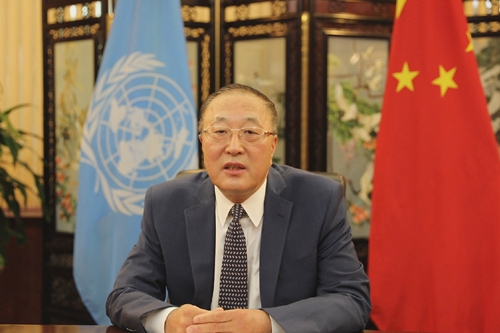| Ambassador Zhang Jun: the Utmost Importance of Promoting Multilateralism in Counter-Terrorism Efforts |
| 2020-07-10 02:18 |
|
On 10 July 2020, during the United Nations Virtual Counter-Terrorism Week, an interactive closing discussion on "Member States' Counter-Terrorism Priorities in the Post COVID-19 Environment" was held, which was moderated by Under-Secretary-General Mr. Vladimir Voronkov. Ambassador Zhang Jun, Permanent Representative of China, participated as commentary and delivered remarks. Ambassador Zhang said that it is of utmost importance to further promote multilateralism in counter-terrorism efforts, during and after the COVID-19 pandemic. Facts have proved that no country can stand alone in the face of pandemic situations, which also shows the growing threat from non-traditional security issues. We must redouble our efforts and enhance our responses. Terrorism knows no borders, and terrorism in all its forms and manifestations constitutes threat to international peace and security. Double-standard should be avoided in fighting against terrorism. We must strengthen our firm support for international mechanisms, and continue to support the UN to play a leading role in counter-terrorism. Adhering to multilateralism, and strengthening international cooperation, is the only option for responding to the challenges. Ambassador Zhang pointed out that facing the new and evolving challenges of terrorism, we must be equipped with new tools, technologies and take more prompt actions in fighting terrorism. While the link between the COVID-19 and terrorist activities need further studies and analysis, we should keep high alert on the impact of the pandemic. We should further strengthen the legal framework and actions, internationally, regionally and domestically, in all fronts of counter-terrorism. Utilization of information technology, intelligence sharing and judicial cooperation should be further enhanced. Relevant international instruments, including relevant Security Council resolutions, should be strictly implemented. Ambassador Zhang emphasized that we need to enhance unity and solidarity in fighting terrorism, and strengthen capacity building. Facing these challenges, no one is safe until everyone is safe. We need to build partnerships among all of us. The United Nations Counter-Terrorism Office (UNOCT) has implemented a large number of capacity-building projects with outstanding results. We hope that UNOCT will continue to strengthen its capacity-building projects in response to cyber terrorism, bio-terrorism, law enforcement cooperation, etc. Counter-terrorism in Africa should also be a priority. Cooperation with regional organizations, including the AU, ASEAN, SCO, EU, is extremely important. Promoting development and regional cooperation are highly encouraged, in response to the needs of member states to eradicate the root causes of terrorism. Ambassador Zhang said, China will continue to strengthen its political and financial support to UNOCT and the international counter-terrorism cooperation. Through the China-UN Peace and Development Fund, we have sponsored a couple of UNOCT's projects in Africa, and in Major Sporting Events. In the future, we will continue to vigorously support the work of the relevant UN counter-terrorism agencies, and to participate in the process of the review of the UN Global Counter-Terrorism Strategy. We are committed to jointly advancing our common struggle against terrorism and the pandemic, to safeguard our common future for all. As to the wrong speech of the representative of the United States concerning Xinjiang, Ambassador Zhang firmly pointed out, China totally rejects the accusation from the US. There is no such a difference between so-called good or bad terrorists. Xinjiang Autonomous Region suffers deeply from terrorism and violent extremism. To address these threats, Xinjiang has taken a series of preventive counter-terrorism and de-radicalization measures, which is in line with the UN Global Counter-Terrorism Strategy and the Plan of Action to Prevent Violent Extremism. These measures have yielded good results. China is firmly opposed to the practice of politicization and double-standard in counter-terrorism, and urges the US to stop such actions and stop interfering in China's internal affairs. This meeting is one of a series of events of the UN Virtual Counter-Terrorism Week held from 6 to 10 July 2020. The Virtual CT Week is hosted by the UNOCT, and is held on web platforms through video and broadcast globally. UN Secretary-General António Guterres attended the opening ceremony and delivered a speech. More than 1,000 representatives from the major UN Global Counter-Terrorism Coordination Compact Entities, member states, academia, civil societies, and media attended the events. The Virtual Week discussion focuses on issues such as the role of the UN and multilateral cooperation, synergies and complementarities between the COVID-19 and counter-terrorism agendas, threat of bio and cyber terrorism, rise of violent extremism and hate speech, victims of terrorism, Foreign Terrorist Fighters (FTFs), counter-terrorism and human rights, the role of youth, civil society and media, and over ten panel discussions were held. The outcome of the meetings will be integrated into the review process of the UN Global Counter-Terrorism Strategy in 2021. |
| |||||||||||||
| |||||||||||||
